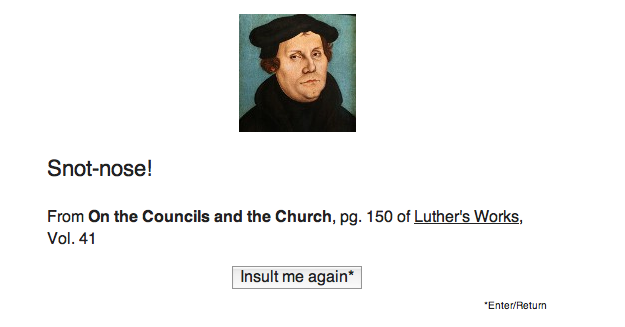Al Mohler is the thinking evangelical’s favourite Southern Baptist, he’s reformed, he’s intelligent, he’s eloquent. He seems like a nice guy. But in a talk at the Ligonier Ministries conference in the US he basically did the anti-Wattke (Wattke was the OT scholar who moved institutions after publishing his views on the possibility that Genesis 1 might be compatible with evolutionary theory). Mohler (as reported at Challies.com) says it’s not. And furthermore, that not holding to a young earth, 6 day, 24 hour, view of creation leads to theological disaster.
If there’s one thing I dislike more than stupid theological debates that can’t be resolved, it’s people who make such debates the yardstick of theological orthodoxy. There are people I love, and respect, on both sides of this debate. And I’m pretty sick of posts like this that caricature opposing views in order to attack them. There’s a word for that logical fallacy. It’s a strawman.
Here’s the first “strawman” from Challies’ post – it’s a rebranding of the “literary theory” that is pretty narrow, and doesn’t look like the literary theory any reformed evangelical I know holds to while questioning the function of Genesis 1-11:
“The literary theory. Here we take the first eleven chapters of Genesis as literary, understanding that the Creation story is merely myth, a story as understood by ancient Hebrews.”
It’s almost never held to be “merely myth” – any literary theorists will affirm essentially the same theological truths as the six day young earth adherent. This is a nasty carricature that pays no heed to the complexities of the debate, and certainly rules out any knowledge that we may bring to the text based on ancient Hebrew literature…
Mohler’s (or Challies’) conclusion based on that first strawman is another fallacy:
“The literary theory has to be rejected out-of-hand since it otherwise contradicts inerrancy. We cannot hold to a robust theory of biblical inerrancy and interpret the chapters in this way.”
Why does reading the Bible as literature, or at the very least, pondering the genre of the received text, rule out a “robust theory of biblical inerrancy”? It seems that by including the qualifiers “robust” in this sentence, and “merely” in the first, Mohler can dismiss anybody who agrees with him 90% of the way by lumping them in with the people who disagree with him 100% of the way. This shouldn’t be a question of semantics – a “plain reading” of Mohler’s views is that unless you hold to a young earth six day creation you think the Bible is an errant myth. This just isn’t true of most of the reformed guys I’ve read this year (and in the past) when it comes to disagreements on Genesis 1. Every big name in American reformed circles seems to have a different view on the question – Piper, Driscoll, Mohler, Keller… the reason thoughtful people reach different conclusions is simple – we weren’t there at creation (and neither was Moses), we weren’t there when Genesis was written, and any postulation on the question of the mechanics of creation (past the “God did it by his word” idea) is purely speculative. It’s guesswork. Some guesses may be more educated than others. But to make this some sort of yardstick for theological orthodoxy is perilously stupid.
This is the kind of issue people lose their jobs over. Because of this ludicrous desire to see the issue at front and centre. The bit I think is the most frustrating is the clamouring over the “reformed” label for your view – as though disagreement on the issue is new. Here’s what Calvin said (in a commentary on Genesis 1:16), if you want to be reformed you at the very least want to be agreeing with Calvin. Right?
“I have said, that Moses does not here subtly descant, as a philosopher, on the secrets of nature, as may be seen in these words. First, he assigns a place in the expanse of heaven to the planets and stars; but astronomers make a distinction of spheres, and, at the same time, teach that the fixed stars have their proper place in the firmament. Moses makes two great luminaries; but astronomers prove, by conclusive reasons that the star of Saturn, which on account of its great distance, appears the least of all, is greater than the moon. Here lies the difference; Moses wrote in a popular style things which without instruction, all ordinary persons, endued with common sense, are able to understand; but astronomers investigate with great labor whatever the sagacity of the human mind can comprehend.”



